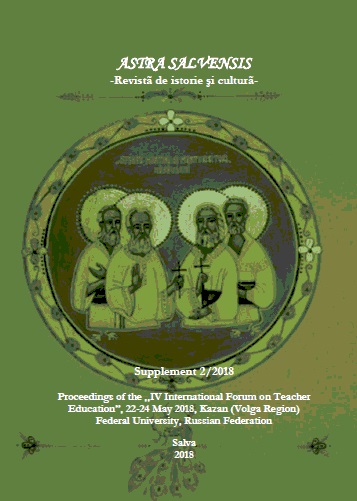CONDUCTING THE FINAL ATTESTATION USING WORLDSKILLS RUSSIA METHODS AS A WAY OF ASSESSING THE DEGREE OF LIFE SAFETY FUTURE TEACHERS‟ PROFESSIONAL COMPETENCE
CONDUCTING THE FINAL ATTESTATION USING WORLDSKILLS RUSSIA METHODS AS A WAY OF ASSESSING THE DEGREE OF LIFE SAFETY FUTURE TEACHERS‟ PROFESSIONAL COMPETENCE
Author(s): Marina А. Morozova, Aleksandr G. Kapustin, Natalia A. Koshkina, Vladimir N. Kasyanov, Oleg Y. BespyatykhSubject(s): Social Sciences
Published by: Asociaţiunea Transilvană pentru Literatura Română şi Cultura Poporului Român - ASTRA
Keywords: WorldSkills methods; final attestation; Life Safety;
Summary/Abstract: The relevance of the materials presented in this article is determined by the implementation of WorldSkills Russia (WSR) methodology and standards in the process of secondary and higher professional education. The purpose of this study is to determine the effectiveness of using WSR techniques in conducting state final certification as a form of assessing the professional competence of life safety future educators. The authors consider the prospects of forming a new competence ―The Life Safety teacher-organizer‖ in the WorldSkills Russia standards. The presented work used theoretical and experimental methods, including the analysis of scientific, normative, educational and methodical documents, observation, pedagogical experiment, method of studying opinions. The article describes the experience of the state final attestation of future life safety teachers at the Faculty of Physical Culture and Sports of the FSBEI HE ―Vyatka State University‖ using the basic principles and techniques of WSR. Due to the lack of approved competence in the WSR standards the authors developed a set of materials, including a sum of tasks, criteria and means of assessment, infrastructure sheets, technological maps, work places equipment in accordance with the techniques of the demonstration exam. The article gives examples of tasks, discusses issues related to the organization of workplaces for attesters, the formation of control measuring materials, which allows obtain reliable information about the development of competencies related to communications, as well as work with both training and special equipment. The article substantiates the advantages of such form of attestation over the traditional one, the necessity for wide dissemination to the intermediate and current forms of attestation of future teachers. The results presented by the authors may be of interest to teachers of higher and secondary education, specialists in the field of education.
Journal: Astra Salvensis - revista de istorie si cultura
- Issue Year: VI/2018
- Issue No: Supp 2
- Page Range: 363-379
- Page Count: 17
- Language: English

